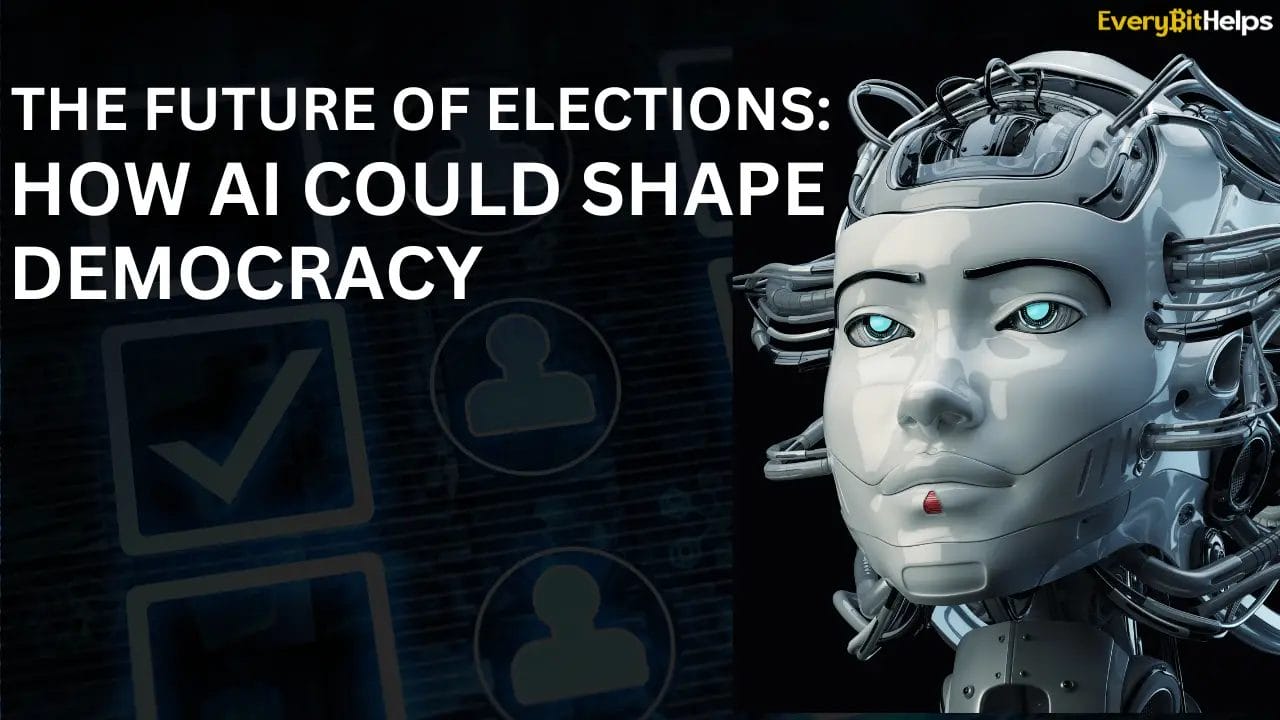In the ever-evolving landscape of technology, Artificial Intelligence (AI) stands as a transformative force. With its ability to learn, reason, and self-correct, AI is transforming numerous sectors, from healthcare and education to finance and transportation. However, one area where its impact could be particularly profound is politics.
As we stand on the threshold of the 2024 US elections, it’s crucial to delve into the potential implications of AI on the electoral process. With its capacity to analyze vast amounts of data and predict trends, this technology could reshape how campaigns are run and how voters make their decisions.
But like any powerful tool, AI has potential benefits and drawbacks. On the one hand, it could enhance campaigns’ efficiency, provide more accurate polling predictions, and even help secure the voting process. On the other hand, there are legitimate concerns about privacy, misinformation, and the ethical use of AI in the political sphere.
The rise of AI in politics raises important questions about how governments will react and adapt. Will there be new regulations to govern the use of AI in elections? How will lawmakers balance the need for innovation with protecting democratic processes?
Evolution of Technology in Elections
To understand the potential impact of AI, it’s helpful to take a step back and examine how technology has historically influenced the political landscape.
The advent of television in the mid-20th century marked a significant turning point. Politicians could enter living rooms across the country for the first time, making their messages more personal and immediate. This shift was famously exemplified in the 1960 U.S. presidential debates between John F. Kennedy and Richard Nixon, where Kennedy’s telegenic appeal arguably helped him secure a narrow victory.
The rise of the internet and social media platforms brought about another seismic shift. These technologies allowed for real-time engagement between politicians and voters and dramatically broadened the reach of campaign messages. They also democratized political discourse, giving voice to individuals and groups previously marginalized in mainstream media.
We can anticipate another significant transformation as we stand on the brink of the AI era. AI, with its ability to analyze vast amounts of data, make predictions, and automate tasks, has the potential to reshape campaigns and voting in ways we are only beginning to understand.
However, as with any technological advancement, integrating AI into the political process will bring opportunities and challenges. As we navigate this new terrain, it’s crucial to learn from the past, taking the lessons of the television and internet ages to ensure that the rise of AI enhances, rather than undermines, our democratic processes.
Revolutionizing Election Forecasting & Voter Targeting
Artificial Intelligence is poised to bring about a sea change in how elections are forecasted, and voters are targeted. The power of AI lies in its ability to sift through and make sense of vast amounts of data, a capability that can be harnessed to predict election outcomes with remarkable precision.
AI algorithms can analyze many variables, from social media sentiment and online search trends to demographic data and historical voting patterns. This analysis can reveal underlying patterns and trends that might be invisible to the human eye, enabling more accurate predictions of election outcomes. This could revolutionize campaign strategies, allowing political parties to allocate resources more effectively and fine-tune their messages to resonate with the electorate.
AI can also play a pivotal role in voter targeting. In the age of digital media, every click, like, and share leaves a digital footprint. AI can analyze these footprints to understand an individual voter’s preferences and behaviours. This information can be used to tailor political ads or messages to match the interests and concerns of individual voters, making them more relevant and engaging.
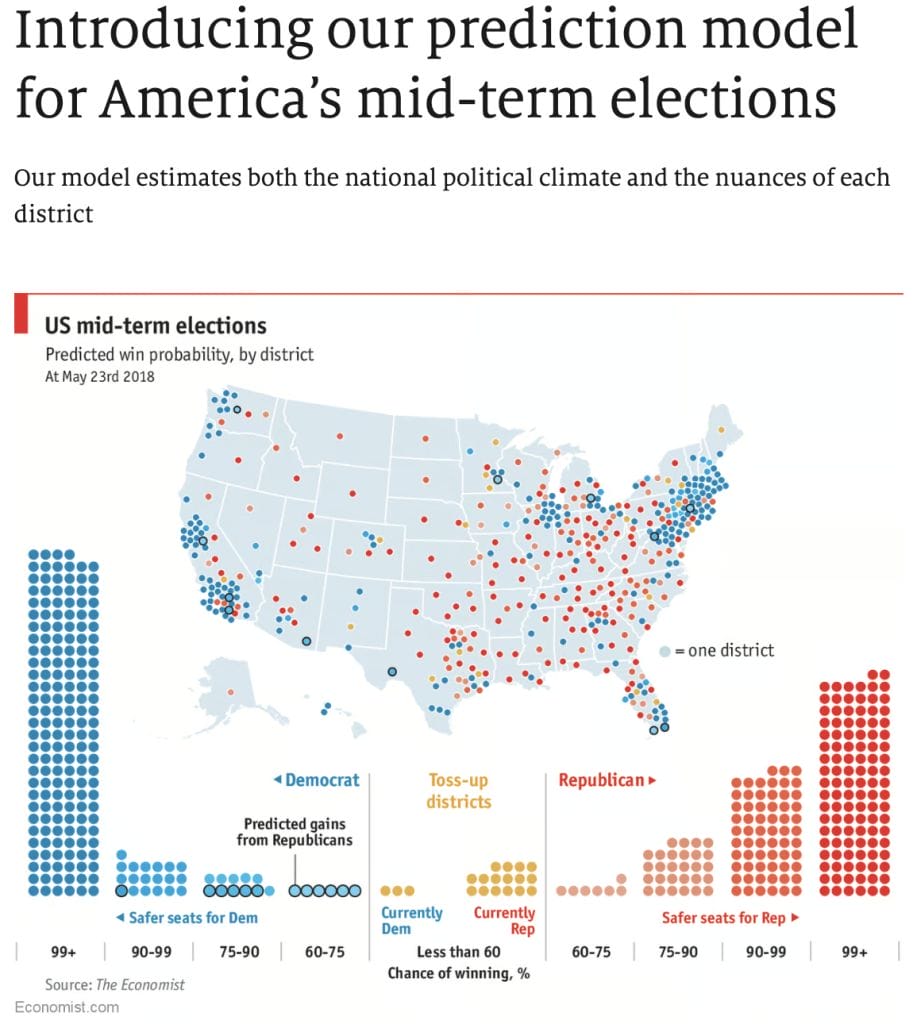
For instance, a young voter who frequently engages with environmental content online might receive targeted messages about a candidate’s green policies. On the other hand, a voter in a manufacturing job might be targeted with messages about a candidate’s plans for job creation and economic growth.
This level of personalization, powered by AI, could potentially increase voter engagement and turnout. It could also lead to more informed voters receiving information directly relevant to their interests and concerns.
However, it’s important to navigate this terrain with caution. While personalized messaging can be beneficial, there’s a fine line between personalization and manipulation. It’s crucial to ensure that the use of AI in voter targeting respects privacy norms and promotes a fair and transparent electoral process.
Dark Side of AI: The Threat of Fake News & Disinformation
While the potential of AI to revolutionize the political landscape is undeniable, it’s equally important to acknowledge and address its potential pitfalls. One of the most pressing concerns in this regard is the role of AI in the propagation of fake news and disinformation.
In the digital age, information spreads at lightning speed, and with AI in the mix, the spread of false information can be amplified exponentially. Advanced AI technologies, such as deepfakes, are a case in point. These sophisticated tools can create highly realistic but entirely fabricated images or videos, making it increasingly difficult for voters to distinguish fact from fiction.
Deepfakes can be used to put words into the mouths of political figures, creating the illusion that they’ve said or done things that never happened. This can potentially sway public opinion based on falsehoods and undermine trust in political figures and institutions.
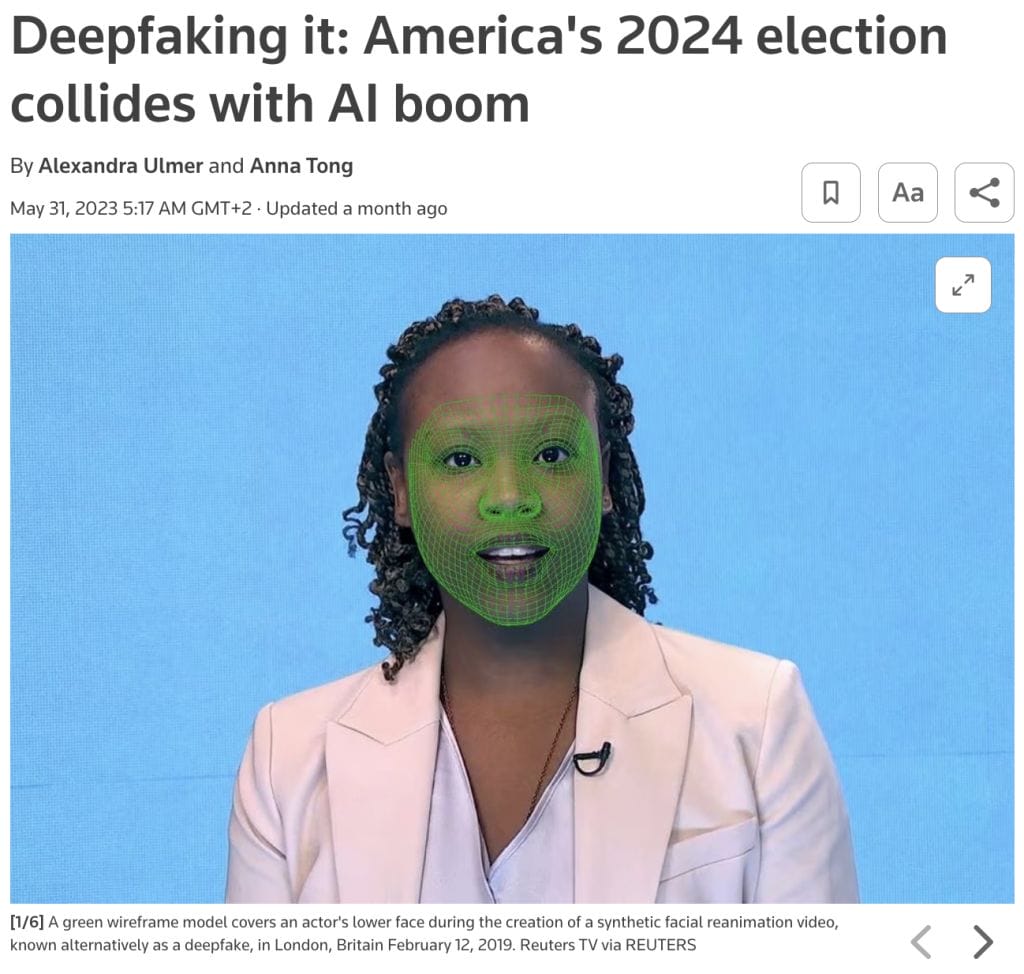
Similarly, AI-powered bots can disseminate misleading information at an alarming rate. These bots can flood social media platforms and online forums with false or biased information, skewing the discourse and potentially influencing voters’ perceptions and decisions.
This muddying of the political waters poses a significant threat to the integrity of elections. It underscores the need for robust measures to detect and counteract fake news and disinformation. This could include advanced AI-powered fact-checking tools, greater transparency around using AI tools in political campaigns, and public education initiatives to help voters critically evaluate online information.
AI as a Guardian: Bolstering Election Security
Amid concerns about the potential misuse of AI, it’s essential to highlight its potential as a force for good. One area where AI shows immense promise is in enhancing election security.
Elections form the backbone of democratic societies, and their integrity is paramount. In an era where threats to election security are increasingly digital, AI can be a powerful tool to safeguard the electoral process.
AI’s ability to analyze vast amounts of data in real time can be harnessed to detect fraudulent voting activity. For instance, AI algorithms can identify patterns that may indicate attempts at voter fraud, such as multiple votes from the same IP address or unusual voting patterns. By flagging these anomalies, AI can help election officials take swift action to investigate and address potential fraud.
In addition, AI can play a crucial role in securing electronic voting systems. As more jurisdictions explore electronic or online voting, the need for robust security measures becomes even more critical. AI can help monitor these systems for signs of hacking or tampering, providing an additional layer of security.
AI can also assist in the post-election audit process. By quickly processing and analyzing voting data, AI can help verify the accuracy of election results and ensure that every vote is accurately counted.
However, while AI offers exciting possibilities for enhancing election security, it’s crucial to remember that technology alone is not a panacea. The use of AI in election security must be complemented by robust legal frameworks, transparency measures, and ongoing efforts to build public trust in the electoral process.
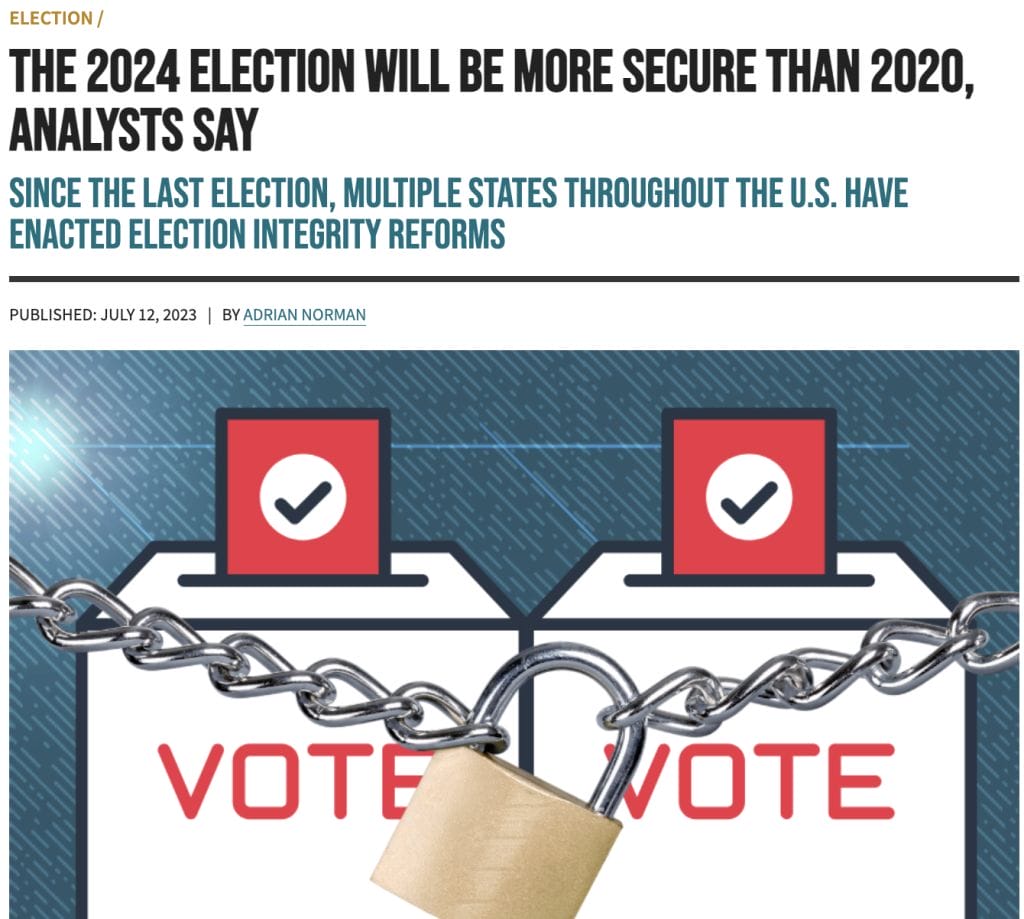
AI & Blockchain: A Powerful Duo for Election Integrity
Combining AI and blockchain technology presents a promising solution for secure and transparent elections. These two groundbreaking technologies can work together to verify the information and guard against the spread of deepfakes, thereby enhancing the integrity of the electoral process.
At its core, blockchain technology is a decentralized and immutable ledger system. Each piece of information, or ‘block’, is linked to the ones before and after, creating a ‘chain’ of data that is nearly impossible to alter undetected. This makes blockchain an ideal tool for recording and verifying election data.
When combined with AI, blockchain can offer even more robust protection against election fraud and misinformation. AI’s ability to analyze vast amounts of data can be used to detect anomalies or suspicious patterns in the voting data recorded on the blockchain. This could help identify attempts at voter fraud or tampering with the voting process.
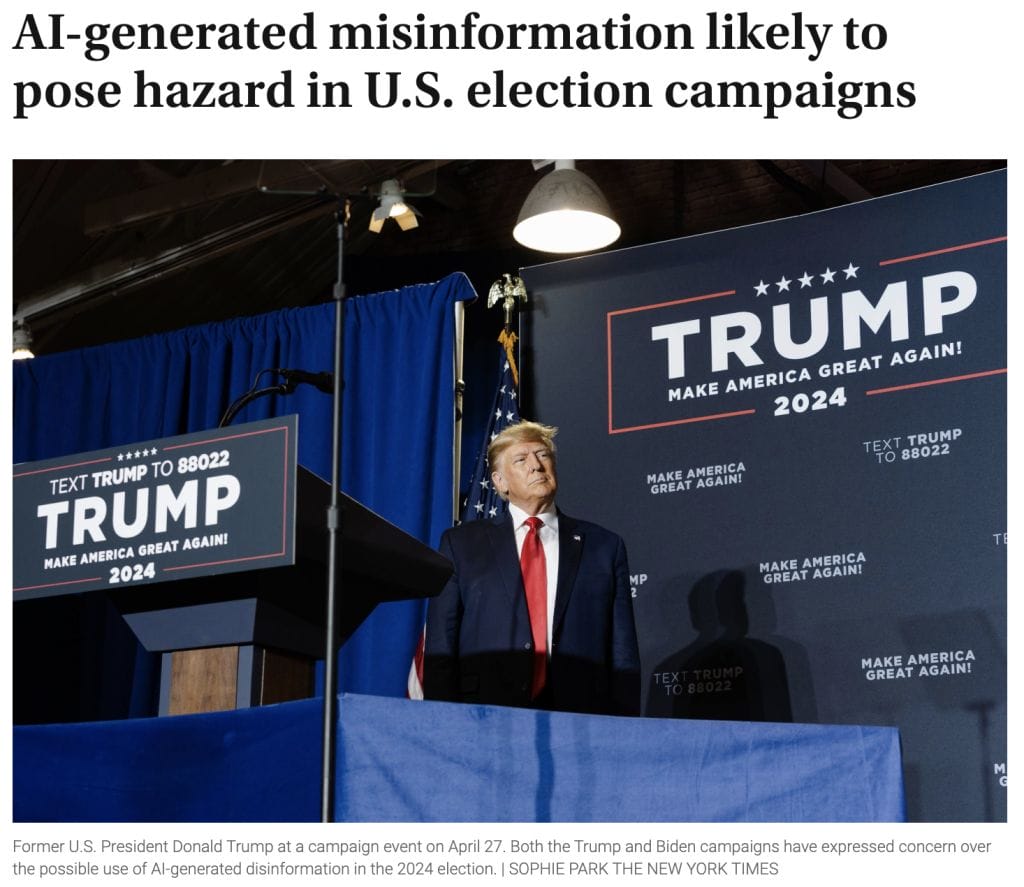
Combining AI and blockchain can be a powerful tool against deepfakes and misinformation. Deepfakes, which are fabricated images or videos created using AI, pose a significant threat to the integrity of elections. However, blockchain technology can be used to verify the authenticity of digital content.
For instance, when a video or image is created, it can be ‘hashed’ onto a blockchain, creating a unique digital fingerprint. If the content is later altered – for example, to create a deep fake – the digital fingerprint will no longer match the original, signalling that the content has been tampered with.
AI can enhance this process by automating the detection and flagging of altered content. By training AI algorithms on large datasets of deepfakes and authentic images or videos, these systems can learn to identify the subtle signs of a deepfake that the human eye might miss.
Ethical Considerations & Regulatory Response
Integrating AI into the electoral process is not just a technological issue; it’s also a profoundly ethical one. AI in elections raises many ethical questions that societies must grapple with.
Firstly, there’s the issue of privacy. Data privacy and consent concerns arise as AI systems become more sophisticated in gathering and analyzing personal data for voter targeting. How can we ensure that voters’ personal data is protected? What measures are in place to prevent misuse of this data?
Secondly, there’s the risk of manipulation. While personalized political messaging can enhance voter engagement, it can also be used to manipulate voters by exploiting their fears or biases. How can we ensure that AI in politics promotes informed decision-making rather than manipulation?
Thirdly, there’s the issue of the digital divide. As elections become increasingly digital, there’s a risk that those without access to digital technologies or the skills to use them effectively may be left behind. How can we ensure that the rise of AI in elections doesn’t exacerbate social inequalities?
In response to these ethical challenges, governments worldwide are exploring ways to regulate the use of AI in elections. This could involve laws about data privacy, requiring consent for data collection, and ensuring transparency in how AI systems operate. There may also be limits placed on the use of AI in political advertising to prevent manipulation.
However, regulating AI in elections is a complex task that requires balancing the need for innovation with the necessity of protecting democratic processes and values. The global nature of digital technologies and the internet also requires international cooperation.
Looking Ahead: Charting the Course of AI in Elections
As we gaze towards the future, the role of AI in shaping elections is becoming increasingly apparent. However, it’s essential to approach this future with a balanced perspective, acknowledging both the opportunities and challenges that AI presents.
On the one hand, AI offers exciting possibilities for revolutionizing the electoral process. From more accurate election forecasting and personalized voter targeting to enhanced election security, AI has the potential to make elections more efficient, engaging, and secure. It could enable more strategic campaigning, a better understanding of the electorate, and a more transparent and fair electoral process.
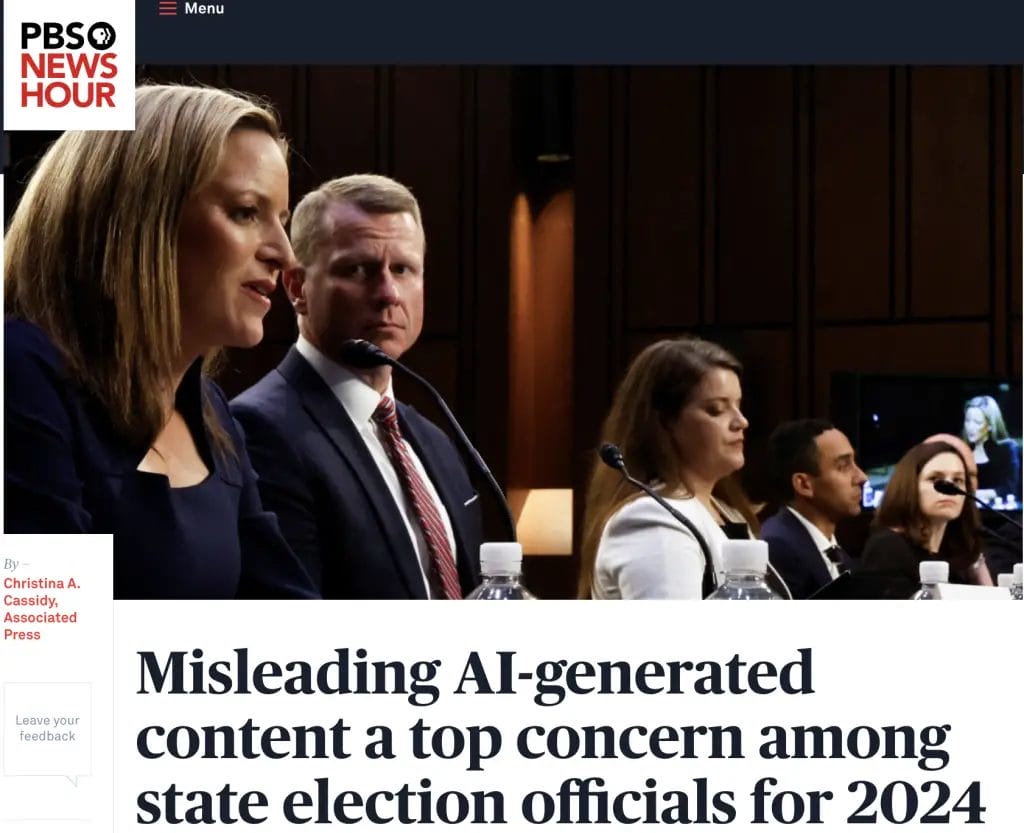
However, the rise of AI also presents new challenges that must be carefully navigated. The potential for AI to spread fake news and disinformation, the ethical concerns around privacy and manipulation, and the need to bridge the digital divide are all issues that need to be addressed. These challenges underscore the need for robust regulatory frameworks, public education initiatives, and ongoing dialogue about the role of AI in elections.
It’s important to remember that while AI can enhance the electoral process, it’s not a substitute for the human elements of elections – the passionate debates, the grassroots campaigning, and the casting of a vote. As we integrate AI into elections, we must ensure that it serves to augment, not replace, these human elements.
FAQ
What are the uses of AI in politics?
AI in politics is utilized for various purposes, including data analysis, voter sentiment analysis, campaign strategy optimization, and predicting election outcomes. It also aids in automating administrative tasks and understanding public opinion through social media analytics.
How will AI be used in elections?
AI will play a pivotal role in elections by analyzing vast amounts of data to forecast voter behaviour, optimizing campaign strategies, and targeting advertisements. Additionally, AI in politics can help detect fake news or misinformation campaigns, ensuring a more informed electorate.
How is the federal government using AI?
The federal government leverages AI in politics to enhance public services, improve decision-making processes, and streamline administrative tasks. AI tools are also employed for national security, fraud detection, and policy formulation based on data-driven insights.
How does AI affect elections?
AI in politics can significantly influence elections by providing insights into voter preferences, enabling targeted campaigns, and predicting potential outcomes. However, it also raises concerns about data privacy, misinformation, and the potential to manipulate public sentiment.

